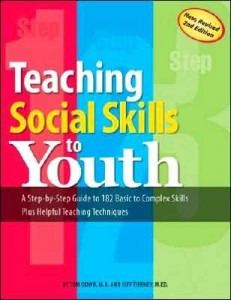 Tom Dowd M.A. and Jeff Tierney M.Ed. – Teaching Social Skills To Youth
Tom Dowd M.A. and Jeff Tierney M.Ed. – Teaching Social Skills To Youth
5/5
A few years ago, Shae and I became group home parents. This basically meant that we were full time foster parents in a house of five teenage girls.
The girls were there for a variety of reasons – some were in care, some were there as an alternative to juvenile detention, some had mental health problems and others had emotional and behavioral disorders (EBD).
As we’ve written before, one of the main parts of our job was to praise them, as this is the most effective way of teaching young people. The things that we were teaching them though were social skills and life skills. These ranged from basic skills like ‘Following Instructions’ and ‘Introducing Yourself’ to more complex skills like ‘Coping With Sad Feelings/Depression’ and ‘Budgeting and Managing Money’.
A large part of our training was focused on how to teach this skills and remembering the steps of the basic skills. We therefore received a copy of this book, which is a step-by-step guide to 182 basic to complex skills. And by step-by-step, they mean step-by-step!
Example Of A Skill’s Steps
When a young person joined the group home, they started off by having to learn what was known as “The Basic 8”. These were 8 basic social skills they needed to master, with them then focusing on different skills as time went on – these would vary depending on their treatment plan.
One of the Basic 8 was “Introducing Yourself” and the steps for this are:
- Look at the person and smile
- Use a pleasant voice
- Offer a greeting. Say “Hi, my name is……”
- Shake the person’s hand
- When you leave, say “It was nice to meet you”
Now, this may sound ridiculous – everyone knows how to greet someone, right?
Wrong.
Many of these young people didn’t initially have this social skill. In fact, many young people – and adults – either don’t have this skill or don’t use it. Shae and I have been amazed at the number of adults we’ve met who, when you introduce yourself, either look at you like you’re an alien or say something like “Um, yeah” rather than replying and saying what their name is!
As part of our job interview, we had dinner at one of the group homes and the youth opened the door when we arrived. Each of them used the above skill and greeted us warmly. Both Shae and I were blown away, as that’s simply not something you usually encounter whether from teenagers or adults.
Additional Learning
Before you get to the 182 different social skills, the book has some informative chapters teaching about:
- The importance of social skills
- Elements of social behavior
- Individual teaching techniques
- Generalization of social skills
- Teaching skills in group settings
- Social skills and treatment planning
Rationales
The chapters above explain concepts like the importance of giving rationales when teaching skills. This means that you give the youth a reason why they should behave in a certain way – “Because I said so” doesn’t count!
For example, you might give rationales like “When you introduce yourself to someone nicely they’re more likely to want to talk with you and be your friend” or “When you accept no for an answer without complaining, it makes me more likely to want to say yes the next time as you’ve shown respect by not arguing.”
Helpful Groupings
At the back of the book, there’s not just one index but five. One of them lists all the skills in alphabetical order, but the other four are even more helpful than that.
This is because the different social skills are grouped together by:
- Skill Type – e.g. social skills, emotional management skills, independent living skills, etc.
- Character Trait – e.g. trustworthiness, respect, caring, etc.
- Behavior Problems – e.g. aggressive & antisocial behavior, depression & withdrawal problems, low self esteem, school behavior & attendance problems, etc.
- Situation – e.g. Interactions with parents & family, interpersonal conflict & disagreement, friendship & dating, etc.
This means that if a young person’s having a problem in a certain area, you can easily find a list of skills that may be appropriate for them to learn.
What Type Of Youth Worker Is This Book Useful For?
This book is an excellent resource for any and every youth worker. No matter what kind of youth work you do, your young people will always need to learn different social and life skills. If you’re a parent, it’s an incredibly useful resource in that context too.
When Should It Be Used?
I’d say it’s most useful in a one-to-one setting, as this gives you an opportunity to address specific skills with a young person. You can then personalize the skills, rationales and steps as appropriate.
Having said that, it can also be used in a group setting, with youth discussing the various steps. It can be especially helpful to have them come up with rationales themselves – if they identify for themselves a reason to behave in a positive way, they’re far more likely to follow through on that action.
Why Give This Book A 5/5 Rating?
Because it works! Having lived and breathed this in a household of teenage girls with different behaviors that they were working on, you can see a profound change in them over time.
When reading the basic skills, it’s easy to be cynical about them – I’ll admit, I was that way when doing the training. But it really does work.
We met a couple of our best friends while being group home parents who had the same role – we’ll be doing an interview with them soon as part of our types of youth work series.
They now have three kids of their own and their kids are the most well-behaved, normal, well-adjusted children I’ve met. Not only is this due to them having such awesome parents, but it’s because they’ve been taught these skills from such a young age. It doesn’t mean they never act up – every young person pushes boundaries – but they know how to behave as they’ve been taught the skills consistently.
How Do I Get A Copy?
You can buy Teaching Social Skills To Youth from Amazon.
Question: In what youth work context do you think you would find this book useful? Let us know in the comments below.
You can also connect with us by:
- Signing up to receive our posts via email
- Following us on Twitter
- Liking us on Facebook
- Signing up to our RSS feed
 “You are not a rude person; do not allow the iPhone to change that.”
“You are not a rude person; do not allow the iPhone to change that.” Goal setting for teenagers is an important
Goal setting for teenagers is an important 